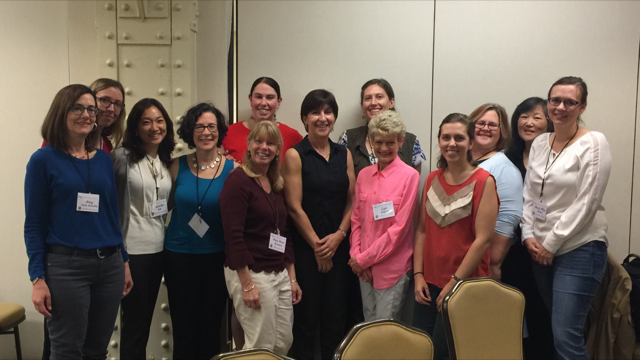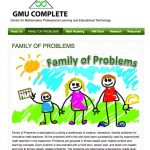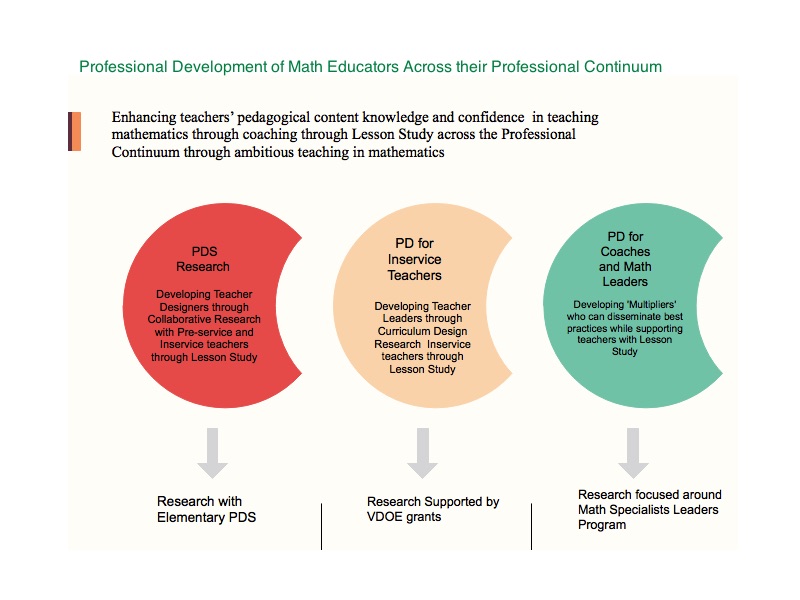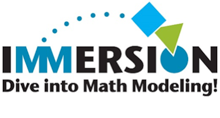Jennifer Suh, PhD, Associate Professor, Mathematics Education
Director, COMPLETE Math Center
jsuh4@gmu.edu
Jsuh_Curriculum Vitae
Jennifer Suh is a mathematics educator in the Graduate School of Education at George Mason University. Dr. Suh teaches mathematics methods courses in the Elementary Education Program and mathematics leadership courses for the Mathematics Specialist Masters and PH.D Programs. She directs the Center for Outreach in Mathematics Professional Learning and Educational Technology, COMPLETE, a joint center between the College of Education and the College of Science. Her research focuses using Lesson Study with school based teams to develop mathematics teaching practices and deepen teachers’ content knowledge through an understanding of children’s development of mathematical meaning/models and representational fluency; Develop problem-based modeling tasks to promote equitable access to 21st century skills: Creativity, Critical Thinking, Communication and Collaboration for diverse student populations in STEM disciplines. Currently, her project called “Math VAULT”, Vertical Articulation to Unpack the Learning Trajectory, focuses on using Lesson Study and Video Studies to learn from rich mathematics tasks implemented across grade levels that unpack the learning progression and enhance the teaching and learning of mathematics.
She is interested in developing teachers’ mathematical knowledge for teaching through modeling mathematics and integrating problem based lessons with teachers through Lesson Study and job-embedded professional development. She examines transforming teachers’ knowledge and practice through qualitative approaches including case studies, collective self-studies and teaching experiments, with a focus on applying educational research and theory into classroom practices, which allows her scholarship to attend to two major audiences: scholars and practitioners.
Learn about math modeling in the elementary grades
http://completemath.onmason.com/math-modeling/
Learn about SPARK STEM: Sparking a Sense of Wonder in STEM
http://sparkstem.onmason.com/
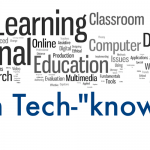 Learn about Bridging Tech-knowledgy in http://mathbridges.onmason.com
Learn about Bridging Tech-knowledgy in http://mathbridges.onmason.com
http://completemath.onmason.com/family-of-problems
 Learn about the Book
Learn about the Book
http://modelmath.onmason.com
MAT H HAPPENINGS
H HAPPENINGS
Learn about Math Happenings
http://mathhappenings.onmason.com
Interests:
Developing students’ mathematics proficiency & teachers’ mathematics knowledge through Lesson Study (socio-mathematical practices, diverse student populations, and representational fluency through mathematics tools and emerging technologies); sustaining professional development with coach-facilitated Lesson Study
Current Prof. Development & Research Projects:
21st Century Skills and STEM http://stemathematics.onmason.com/
Mathematical Modeling http://mathematicalmodeling.wix.com/mysite

Research Interests:
Developing students’ mathematics proficiency & teachers’ mathematics knowledge through Lesson Study (socio-mathematical practices, diverse student populations, and representational fluency through mathematics tools and emerging technologies); sustaining professional development with coach-facilitated Lesson Study
Assistant Director of the Mathematics Education Center
Project Investigator for COMPLETE MATH COMPLETE Math Center
http://cehd.gmu.edu/people/faculty/jsuh/
SUMMER MATH FOR KIDS E=MC²
Current Prof. Development & Research Projects:
21st Century Skills and STEM http://stemathematics.onmason.com/
Mathematical Modeling http://mathematicalmodeling.wix.com/mysite
Current Research Grants
Math Modeling in the Elementary Grades
http://nsfimmersion.onmason.com/
1) Mathematics Teacher Development
I examine ways in which the teacher led professional development model like Lesson Study develop reflective practitioners and deepen teachers’ mathematical proficiency. With Lesson Study, I use action research methodologies to probe into important stages of teaching and learning: 1) Collaborative planning phase, where novice, experienced, special educators and mentors collaborate on planning the research lesson; 2) Teaching and observation, where one teacher teaches the research lesson and the others observe using an observation protocol; 3) Debriefing phase, where teachers reflect on the lesson design, task, student engagement and learning and discuss future steps. Through Lesson Study, I examine the role of coaches as they serve as the catalyst for sustainable change for teachers’ instructional practice at the local level with the school-based professional development model.
CURRENT PROJECT: TRANSITIONS
2) Mathematical Modeling & Modeling Mathematics: Building Strategic Competence & Representational fluency
Math modeling connects students’ math understandings with math happening around them in their everyday life, work, and play. The decisions they make in life have so much to do with math and an important way to help students appreciate math and develop a productive disposition is to relate it to their need and search for quantitative answers. For example, how often as parents are we asked, ” Are we there yet?” ” When is dinner ready?” Think about all the math involved in answering that! Sure, we make many of our decisions in our lives by estimating but there are millions of math in context that parents and teachers can capitalize on so we are able to raise more quantitatively-literate kids.
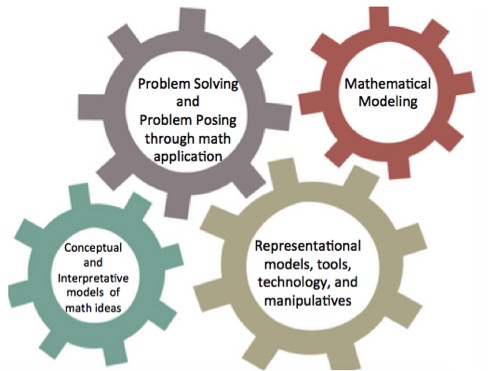 Modeling Mathematics with Representational models, tools and emerging technologies in the classroom:
Modeling Mathematics with Representational models, tools and emerging technologies in the classroom:
Through my research, I explore ways to incorporate and elicit multiple representations of concepts in order to build flexibility with mathematical concepts. Translations among the different representations assesses whether a student conceptually understands a problem. My research efforts focuses on effective methods in building representational fluency, that is allowing students to translate or reinterpret a mathematical idea from one mode of representation to another: from real life experiences, manipulative models, pictorial representations, written symbols and spoken words. In addition, I focus on particular representations such as virtual and physical manipulatives. I am interested in how different mathematical tools or representations elicit different models for thinking about a mathematical concept. I am very interested in the potential of emerging technologies and their unique affordances in the teaching and learning of mathematics, such as applets, virtual manipulatives and the SmartBoard.
CURRENT PROJECT: IMMERSION: Mathematical Modeling in the Elementary Grades IMMERSION WEBSITE
3) Building mathematics proficiency for diverse learners through high leverage teaching practices
Teaching and learning must respond to the demographic changes that have occurred in the student population over the past several decades. Traditional pedagogical approaches do not serve nontraditional students equally and do not meet the needs of all students. Building mathematical proficiency includes developing five “intertwined” strands: 1) Conceptual Understanding, 2) Procedural Fluency, 3) Strategic Competence, 4) Adaptive Reasoning, and 5) Productive Disposition (NRC, 2001). So how do we build mathematics proficiency with diverse population of students in the United States, linguistically, culturally and with special needs? My research focuses on using the five NCTM process standards: communication, representations, reasoning and proof, connection, and problem solving with students from diverse backgrounds to build mathematical proficiency. What is nature of the mathematical task/problem and the mathematical discourse that give teachers and students opportunities to develop these different processes? And how does the social culture of the mathematics classroom affect students from different cultures? Critical Thinking and problem-solving skills are high leverage teaching practices that need to be promoted especially because many teachers are beginning to cater to teaching to the test due to pressure from the state testing. I am currently investigating ways mathematical discourse and the social culture of the classroom impact students learning.
CURRENT PROJECT: Use of 8 Teaching Practices in Preservice and Inservice PD with the use of Edthena
Projects
http://mathematicalmodeling.wix.com/mysite
What is IMMERSION?
The acronym stands for: Integrating Mathematical Modeling, Experiential learning and Research through a SustainableInfrastructure and an Online Network for teachers in the elementary grades 2014 – 2017 A National Science Foundation Sponsored STEM-C Program (NSF-1441024) through George Mason University, Montana State University, and Harvey Mudd College Program Email: nsfimmersion@gmu.edu NSF Award Abstract: 1441024
TRANSITIONS Math
Problems Powerpoints & Materials
Lesson Study
Math tech-tools
Resources &Videos
About Project TRANSITIONS
TRANSITIONS: Transforming mathematics instruction through Mathematical Modeling, Algebraic Thinking and Proportional Reasoning: Teaching and Assessing Virginia’s Mathematics SOL
CENTER FOR OUTREACH IN MATHEMATICS PROFESSIONAL LEARNING AND EDUCATIONAL TECHNOLOGY (COMPLETE) IN NORTHERN VIRGINIA was to create a collaborative network for knowledge development in mathematics teaching and learning. It provides a forum for teachers to collaboratively plan lessons, exchange best instructional practices and effective uses of tech-knowledgy tools to design instructional tasks that promote algebraic conceptual thinking. Teacher collaboration enhances their professional practice which then affects students’ learning. This project is led by Dr. Jennifer Suh and Dr. Padhu Seshaiyer at George Mason University through grants funded by the Virginia Department of Education
Website by Dr. Jennifer Suh
Assistant Professor of Mathematics Education
email: jsuh4@gmu.edu
link to Dr. Suh’s website: http://mason.gmu.edu/~jsuh4
COMPLETE math website http://completemath.onmason.com
TRANSITIONS http://completemath.onmason.com/transitions/
IMMERSION Mathematical Modeling
http://drjennifersuh.onmason.com/modeling-math-ideas/
http://mathematicalmodeling.wix.com/mysite
SPARK STEM http://sparkstem.onmason.com
Dr. Suh’s Math BLOG-Math Happenings http://mathhappenings.onmason.com
Teaching through Mathematics Techknowledgy http://mathbridges.onmason.com/
Assistant Director of the Mathematics Education Center
Project Investigator for COMPLETE MATH COMPLETE Math Center
http://cehd.gmu.edu/people/faculty/jsuh/
SUMMER MATH FOR KIDS E=MC²
Jennifer Suh is an Associate Professor in the Graduate School of Education, College of Education and Human Development, George Mason University. Dr. Suh teaches mathematics methods courses in the Elementary Education Program and mathematics leadership courses for the Mathematics Specialist Masters and PH.D Programs. She directs the Center for Outreach in Mathematics Professional Learning and Educational Technology, COMPLETE, a joint center between the College of Education and the College of Science. Her research focuses on: Implementing Lesson Study to develop pedagogical mathematics knowledge across the continuum from pre-service teachers to mathematics teacher leaders; Building children’s development of mathematical meaning through math modeling and representational fluency; Promoting equitable access to 21st century skills through problem-based learning encouraging creativity, critical thinking, communication and collaboration for diverse student populations. Through formal and informal educational outreach, Dr. Suh enjoys working with schools, communities teachers and parents to show how math can be useful in solving real world problems and be enjoyable to teach and learn. Dr. Suh lives in Virginia with her husband Tim and two sons, Jeremy and Zachary.
Vitae is a Latin word that means, the course of one’s life and career. I feel grateful to have found teaching as a source of inspiration in my life and career!
GMU MATH ED PROGRAMS
PhD. Program https://gse.gmu.edu/math-education-leadership/phd-in-education-mathematics-education-leadership-specialization
M.Ed. Program Mathematics Specialist Leader Concentration in Mathematics Specialist Leader (K-8) (MSLR)
Initial Licensure Programs
